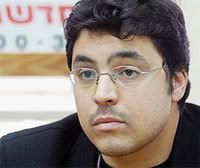Israeli Students and the Specter of Shochat: How Does a 70% Tuition Hike Sound?
As we reported previously, students have been locked in a pitched campaign over the future of higher education in Israel. A government committee created to consider educational reform, named after the committee's head, Avraham Shochat (a twice-former Finance Minister), was widely expected to recommend dramatically raising tuition and cutting government funding. Earlier this year, the largest Israeli student union declared a strike against Shochat and against students and faculty not having any say in the future of their institutions. After weeks on strike, the government agreed to negotiate with students. Those negotiations ended with significant victories for the students, victories I'd argue impossible without such an exemplary strike.
One of the concessions made by Olmert's government was that "the findings of the Shochat Committee on higher education will be discussed with the students until an agreement is reached before they are presented to the government." Whoops! Guess the committee forgot, as they released the recommendations today (all 213 pages of them), without consulting students.
As nobody I know is fluent in Hebrew, it'll probably be awhile before a comprehensive look at the recommendations is done in English. From what we've been able to gather, Shochat is pushing for (among other things):
- a 70% tuition hike
- increased reliance on loans
- salaries for faculty (research and lecture) to be based on "performance"
- nothing that would stem the ever-growing tide of privatization in higher ed.
 Itai Shonshein, National Student Union chairman. Photo courtesy YNetNews.
Itai Shonshein, National Student Union chairman. Photo courtesy YNetNews.From YNetNews:
National Student Union chairman, Itai Shonshein, said in response: "In late May the government signed an agreement with the students saying that the State is obligated to accept the position of the students regarding any changes to tuition fees. Our opinion on the matter is well known and that's why so many cabinet ministers support us.
"These are only recommendations, which we will consider. We thank Avraham Shochat for all the work he's done but according to the agreement we will determine the tuition rates and we must give our approval. We have our own models and we're meeting with economists and lawyers to work it out. I believe that if the government upholds the agreement there cannot be a change without our consent."
Shonshein warns however that students will not hesitate to go on strike once more. "If we are not called (to discuss the changes) – we have shown out strength in the past, we have the power.
"We have all the tools we need, including the legal ones. We know how to fight. I hope it won't come to that and that the prime minister upholds the agreement," he said. [Full article here]
In general the Israeli media is coming down heavily in favor of Shochat:
- "Analysis: Will the Unions Follow Students' Interests?" (Jerusalem Post)
- "Editorial: The Students Must Pay" (Haaretz)
Their arguments generally fall along one of two thrusts: 1) "Shochat has some great ideas and the student unions should follow the interests of their rank-and-file," and 2) "privatization? Drastic tuition hikes? Hey, everybody's doing it, man!" Funnily enough, as was mentioned earlier, it was the students, not the union leadership, that kept agitating to continue the strike. As for the "everybody's doing it" argument (Haaretz):
The students should also realize that the overall trend in the West is to raise the cost of tuition. The former British prime minister, the social-democrat Tony Blair, upped university tuition to between 1,000-3,000 pounds sterling per year. In Australia, which is substantially wealthier than Israel, they began charging tuition for university education, as they have begun to do in the Netherlands, in some parts of Germany, in New Zealand and even in Communist China. [Full article here]
I know Israel's establishment often gets its share of the need to compare their country with others, but of all the things to pick up on from other industrialized democracies, they choose tuition hikes?!